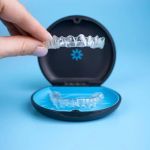- 1-Understanding-Tooth-Sensitivity-Caused-by-Brushing
- 2-Proper-Brushing-Techniques-to-Reduce-Sensitivity
- 3-Choosing-the-Right-Toothpaste-and-Brush
- 4-Additional-Care-and-Professional-Advice
- 5-Real-Life-Experience-and-Effective-Solutions
1. Understanding Tooth Sensitivity Caused by Brushing
Many people wonder how to prevent tooth sensitivity caused by brushing, as it can make routine oral hygiene uncomfortable. Sensitivity often occurs when brushing too hard or using a hard-bristled toothbrush, which can wear down enamel or irritate exposed dentin.
Other factors like gum recession or aggressive brushing habits contribute to this sensitivity, causing sharp pain when teeth come into contact with hot, cold, or sweet stimuli.
2. Proper Brushing Techniques to Reduce Sensitivity
The key to preventing sensitivity is adopting gentle brushing methods. Use soft, circular motions instead of vigorous back-and-forth scrubbing, and avoid applying excessive pressure.
Brushing twice daily for two minutes with moderate pressure protects enamel and gums, while removing plaque effectively.
3. Choosing the Right Toothpaste and Brush
Using toothpaste formulated for sensitive teeth can significantly reduce discomfort. These products often contain ingredients like potassium nitrate or stannous fluoride that help block nerve sensations.
Selecting a soft-bristled toothbrush is equally important. Electric toothbrushes with pressure sensors provide added protection by alerting users if they brush too hard.
4. Additional Care and Professional Advice
Incorporating fluoride rinses and avoiding acidic foods can further protect sensitive teeth. Regular dental checkups enable early detection of enamel erosion or gum issues.
For personalized advice and specialized products, visiting a trusted dental provider such as Dentistry Toothtruth can provide tailored solutions to your tooth sensitivity challenges.
5. Real Life Experience and Effective Solutions
Jessica struggled with tooth sensitivity for years due to aggressive brushing. After consulting her dentist and switching to a sensitive toothpaste combined with softer brushing techniques, she noticed a remarkable improvement within weeks.
Her story highlights the importance of proper care and expert guidance in managing tooth sensitivity. By learning how to prevent tooth sensitivity caused by brushing, you can protect your smile and enjoy comfortable oral care routines every day.







 Mayfair Family Dentistry4.0 (435 review)
Mayfair Family Dentistry4.0 (435 review) North Park Family Dental: Dr. Michelle Kline4.0 (25 review)
North Park Family Dental: Dr. Michelle Kline4.0 (25 review) Smooth Dental and Orthodontics4.0 (371 review)
Smooth Dental and Orthodontics4.0 (371 review) Alameda Dental Group4.0 (169 review)
Alameda Dental Group4.0 (169 review) Daydream Dental - Top Rated Holistic Dentist in Orange County5.0 (103 review)
Daydream Dental - Top Rated Holistic Dentist in Orange County5.0 (103 review) Whitman Dental Center4.0 (1018 review)
Whitman Dental Center4.0 (1018 review) The Importance of Oral Health Education During Pregnancy for a Healthy Pregnancy
The Importance of Oral Health Education During Pregnancy for a Healthy Pregnancy Best Tips for Brushing Your Teeth Properly for Healthy Gums: Essential Techniques for Oral Health
Best Tips for Brushing Your Teeth Properly for Healthy Gums: Essential Techniques for Oral Health Why Skipping Dental Checkups Can Lead to Bigger Oral Health Problems
Why Skipping Dental Checkups Can Lead to Bigger Oral Health Problems Advantages of Porcelain Dental Restorations
Advantages of Porcelain Dental Restorations How Can Diabetes Cause Tooth and Gum Problems? Preventing and Managing Oral Health Issues
How Can Diabetes Cause Tooth and Gum Problems? Preventing and Managing Oral Health Issues Healthy Habits for Promoting Good Oral Health and Hygiene: Tips for a Healthy Smile
Healthy Habits for Promoting Good Oral Health and Hygiene: Tips for a Healthy Smile